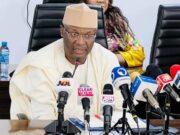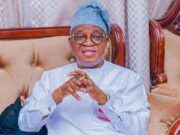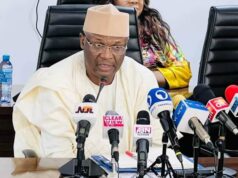The politics of Rivers State is witnessing a seismic shift as the longstanding feud between Governor Siminalayi Fubara and his estranged mentor turned rival, Minister of the Federal Capital Territory, Nyesom Wike, escalates, with both sides intensifying efforts to consolidate power ahead of the anticipated showdown in 2027.
Since the inception of the crisis, which has defied numerous mediation attempts, including intervention by President Bola Tinubu, stakeholders have increasingly rallied behind either Wike or Fubara, setting the stage for a protracted battle that analysts predict will define the state’s political trajectory for years to come.

Fubara, embarking on his bid for a second term, aims to assert his independence and showcase his leadership prowess without relying on political godfathers. Conversely, Wike, determined to exert his influence, seeks to thwart Fubara’s reelection bid and assert his dominance over the state’s political landscape.
In a recent public address, Wike exuded confidence, declaring his invincibility in the upcoming elections and emphasizing the unity within the All Progressives Congress (APC) and Peoples Democratic Party (PDP) factions in Rivers State under his leadership.
Observers note that Wike has strategically consolidated his grip on power by assuming control of both the PDP and APC leadership structures in the state. Following the dissolution of the APC state working committee, Wike’s ally, Chief Tony Okocha, was appointed as chairman of a caretaker committee, signaling Wike’s influence over the party.
 Advertorial
Advertorial
Additionally, Wike has orchestrated the defection of 24 members of the Rivers State House of Assembly to the APC, maintaining their allegiance to him and effectively challenging Fubara’s authority.
Addressing the political imbroglio, Wike emphasized his refusal to intervene in the affairs of the legislature, rebuffing Fubara’s attempts to sway their allegiance and emphasizing the importance of upholding democratic principles.
In a calculated move to bolster his support base, Wike has secured key federal appointments for his loyalists, strategically positioning them to influence the state’s political dynamics in the run-up to the elections.

Meanwhile, Fubara has been actively recruiting former allies of Wike to his camp, aiming to weaken the minister’s grassroots influence, pivotal in securing victory in the state.
In a significant display of support for Fubara’s administration, prominent PDP leaders, including Uche Secondus, rallied behind the governor, signaling a shift in allegiance and bolstering Fubara’s bid for reelection.
Earlier, former coordinators of Wike’s Grassroots Development Initiative pledged their allegiance to Fubara, emphasizing their commitment to safeguarding the PDP’s mandate in the state.
Fubara, during a state event, subtly criticized his predecessor’s leadership style, advocating for inclusivity and dialogue over authoritarianism. He underscored his commitment to transparent governance and legacy-building, contrasting with Wike’s confrontational approach.

In response to Wike’s recent remarks, Fubara maintained a measured stance, urging for peace and restraint in the face of escalating tensions. He emphasized the need for constructive engagement and underscored his administration’s commitment to democratic ideals.
As the rift between Wike and Fubara deepens, stakeholders express hope for a resolution, urging both parties to prioritize the state’s interests over personal ambitions. However, the path to reconciliation remains uncertain, with the specter of political confrontation looming large over Rivers State’s future.

















